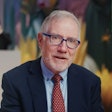
The U.K. Royal College of Radiologists (RCR) has called for changes in how overseas doctors working for teleradiology companies are regulated. To underline its resolve, RCR officials have issued a 13-point position statement, met with the U.K. General Medical Council (GMC), Care Quality Commission, and expressed their concerns to the Department of Health.
"The reporting of patients' images by a local radiologist who can speak directly to other clinicians is the best for patients," noted RCR President Dr. Giles Maskell. "Remote reporting or teleradiology can provide a useful alternative when local services are overstretched. However, patients deserve the reassurance that qualityand safety are always the first priority, whoever reports their images."
 We must reassure patients that quality and safety are always the first priority, whoever reports their images, says Dr. Giles Maskell.
We must reassure patients that quality and safety are always the first priority, whoever reports their images, says Dr. Giles Maskell.
All radiologists who issue reports on U.K. patients should be subject to revalidation or an equivalent process, regardless of where they are based, he added. Doctors practicing in the U.K., including those working for teleradiology companies, must be registered and hold a current license to practice with the GMC and are subject to revalidation, but increasingly doctors based outside the U.K. are being employed to report on images of U.K. patients. Maskell and others are concerned that these radiologists are not required to be registered with the GMC, have a license to practice, or be subject to a process of revalidation.
In the document, released on 10 June, RCR said it strongly supports the European Society of Radiology (ESR) statement that teleradiology should be explicitly defined as a medical act in order to ensure quality of care and patient safety, and that the same level of guarantee, in terms of quality and safety, must be applied to these services as compared with standard medical acts. Interestingly, however, the RCR does not make any distinction between overseas service providers based within the EU and those based outside of the EU.
According to the authors, "The RCR does not agree with the European directive that requires teleradiology to be provided in accordance with the legislation of the teleradiologist's member state (country) of establishment and not with the legislation of the member state where the patient underwent the imaging. We believe that in some situations this could lead to lower standards of care, regulation, and protection than in the U.K. and does not give a patient in the U.K. the same level of assurance and legal protection as is the case with other medical interactions."
Teleradiology providers who work quite extensively (but not exclusively) with non-U.K. radiologists based outside the U.K., such as Radiology Reporting Online and Telemedicine Clinic, are likely to be most affected by any new regulations.
 The RCR statement is likely to lead to more discussions on patient consent, according to Dr. Stephen Davies.
The RCR statement is likely to lead to more discussions on patient consent, according to Dr. Stephen Davies.
Dr. Stephen Davies, medical director of Medica Reporting, said he thinks the document is consistent with the college's previous stance on teleradiology and largely reinforces the approach advocated in previous statements, although he stressed he had only briefly read the RCR statement due to lecturing duties at this week's U.K. Radiological Congress (UKRC) in Manchester. Because Medica only uses accredited U.K.-based radiologists with at least two years' experience in the National Health Service (NHS), he does not think the new statement will have a big impact on the company.
"Producing high quality, accurate reports is at the heart of what we do, and that won't change," he noted. "Patient care and safety is still the main focus of our business."
It's also important to understand that teleradiology companies are not looking to displace the local radiology service, but are merely enhancing it and filling in the gaps in provision, added Davies, who is a radiologist at the Cwm Taf Health Board in South Wales and a former president of the British Institute of Radiology (BIR). One point that he has noted is the statement regarding patient consent, which looks set to renew discussions on this topic.
Similarly, Dr. Dan Collie, managing director of Expert Eye and a consultant radiologist at Fife Acute Hospitals NHS Trust and Spire Murrayfield Hospital in Edinburgh, said he did not anticipate that the RCR statement would affect his company because it does not work with overseas radiologists.
The RCR position statement lists 13 key principles for the use and practice of safe, high-quality teleradiology, including:
Patients should be clearly informed if their imaging tests are to be reported by a radiologist working outside the service where the images were acquired.
Teleradiology must form part of an integrated radiology serviceand be subject to the same governance framework as the rest of the service with all participating radiologists working within a clearlydocumented quality assurance framework in line with RCR guidance. If a trust identifies an issue with the service of a teleradiologist, it is the responsibility of the teleradiology company to address this issue, and it's not acceptable for the company to reassign the teleradiologist to a different trust until the matter is resolved.
The person interpreting the examination and submitting the report to the referring physician must be one and the same.
Teleradiology is a medical act and should thereforebe governed by the same systems that safeguard patients in all other medical acts.
A teleradiology service should always have the safetyand well-being of the patientas its first priority.Secondary incentives, financial or otherwise, must always besubsidiary.
While the RCR recognizes there is a role for teleradiology, it believes this should not replace or destabilize the traditional model of an on-site,local radiology service, and it is time for the appropriate measures to be put in place to protect and assure patients, concluded the statement.
For more information about the RCR statement, click here.



















